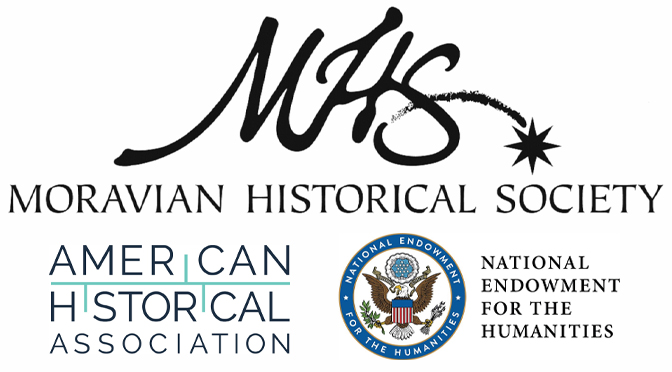Nazareth, PA—The Moravian Historical Society (MHS) is honored to announce that it has been awarded funding from the American Historical Association’s Grants to Sustain and Advance the Work of Historical Organizations Program, which provides relief to institutions adversely affected by the COVID-19 pandemic. This opportunity was made possible with support from the National Endowment for the Humanities (NEH) through the American Rescue Plan Act of 2021.
These funds will enable the Moravian Historical Society to digitize important archival assets, hire a digital archivist to oversee the project, support the work of our part-time curator of collections, and provide resources to bolster our technology capabilities. “This digitization project is essential to the historical work that we do,” stated Susan Ellis, the Executive Director of the Moravian Historical Society. “Having an online resource will allow researchers to make meaningful connections never before known. I am most excited that the curated online collections will enable the general public to engage with our collections in new and exciting ways.”
The Moravian Historical Society will use the grant funds to make its important historical resources more accessible, enhance its educational resources, inspire ongoing dialogue, and spark new opportunities for research. “This is a transformative step forward for our small museum,” Ellis remarked. The pandemic demonstrated the need to make the Moravian Historical Society’s early-American and Moravian history resources digitally accessible. Virtual programs offered by MHS during the pandemic were well-received and attended by audiences from around the world. MHS has also received a record number of research requests over the past few years. Moving forward, the Moravian Historical Society will build on its record of providing learning opportunities for audiences of all ages, educational levels, and cultural backgrounds. “Providing digital access is crucial to fulfilling our mission and is a critical next step for our organization,” Ellis said.
The Moravian Historical Society is one of fifty grant recipients, which include site-based organizations, membership associations, and history departments at Historically Black Colleges and Universities. Awardees will implement short-term projects that explore new ideas or build on experiments initiated during the pandemic—from online programming or publications to using new technologies or expanding audiences and accessibility.
“The past two years have been challenging for small history organizations,” said James Grossman, executive director of the American Historical Association. “Our awardees have made compelling cases for their status as essential resources, making vital contributions to public culture. The American Historical Association (AHA) is pleased to provide funding for our colleagues to promote historical work, historical thinking, and the presence of history in public life.”
“NEH is grateful to the American Historical Association for administering American Rescue Plan funding to help history organizations around the country recover from the pandemic,” said NEH Chair Shelly C. Lowe (Navajo). “Small museums, historical societies, college history departments, historic sites, and community archives are essential to keeping and telling America’s story. These ARP awards will allow these institutions to develop new programs and resources that will expand access to this important history.”
To learn more about the Moravian Historical Society’s grant project please visit the American Historical Association’s website.
About the Moravian Historical Society: Founded in 1857, the Moravian Historical Society is one of the oldest historical societies in Pennsylvania. The collection consists of two Moravian structures—the 1740-1743 Whitefield House and the 1740 Gray Cottage, the oldest Moravian structure in North America—and more than 20,000 historical objects including furniture, decorative arts, paintings, works on paper, musical instruments, textiles, firearms, scientific instruments, metals, and other objects important to the story of early America. Also under the care of MHS are photographs, a large historical library, and archives of personal, missionary, and family papers, and genealogies. The Moravian Historical Society shares the fascinating stories of the Moravians and their contributions to worldwide culture through educational programs, guided tours, engaging museum exhibits, publications, and public activities. Located in Nazareth, Pennsylvania the Moravian Historical Society Museum is open every day from 1– 4 p.m.
About the American Historical Association: Founded in 1884 and incorporated by Congress in 1889 for the promotion of historical studies, the American Historical Association provides leadership for the discipline and promotes the critical role of historical thinking in public life. The Association defends academic freedom, develops professional standards, supports innovative scholarship and teaching, and helps to sustain and enhance the work of historians. As the largest membership association of professional historians in the world (nearly 12,000 members), the AHA serves historians in a wide variety of professions and represents every historical era and geographical area.
About the National Endowment for the Humanities: Created in 1965 as an independent federal agency, the National Endowment for the Humanities supports research and learning in history, literature, philosophy, and other areas of the humanities by funding selected, peer-reviewed proposals from around the nation. Additional information about the National Endowment for the Humanities and its grant programs is available at www.neh.gov.
Information provided to TVL by:
Moravian Historical Society
https://www.moravianhistory.org/





